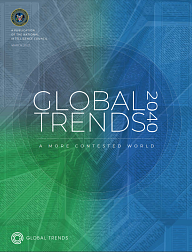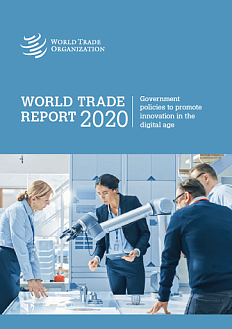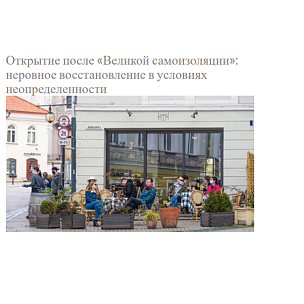The Global Trends 2040: A More Contested World report was produced by the United States’ National Intelligence Council as part of the Global Trends project which is designed to provide an analytic framework for the incoming US president and the new administration. Each Global Trends report assesses critical drivers and scenarios for global trends with an approximate time horizon of fifteen years. The previous Global Trends report was published in 2017 for the preceding US administration.
The authors of the report note that the global community is getting increasingly fragmented as it faces cascading global challenges. These challenges are testing the resilience of systems and models, often exceeding their capacity. As contestation within communities, states, and the international community is growing, adaptability and capacity for collective action become core assets.
The Roscongress Foundation presents the salient points of the publication accompanied by fragments of broadcasts of relevant panel discussions from the business programme of international events held by the Roscongress Foundation.
Four structural forces come to the fore, being prevailing trends that determine which scenario will be played out.
The authors of the report examine structural forces in four core areas:
- Demographics. Slowing global population growth and a rising median age will help some developing economies, but rapidly aging and contracting populations will weigh on many developed economies. Decades of progress in education, health, and poverty reduction will be difficult to build on or even sustain. Pressure for migration is likely to increase.
- Environment. Climate change will exacerbate risks to human and national security and force states to make hard choices and tradeoffs. The burdens will be unevenly distributed, heightening competition between states and encouraging political movements.
- Economics. Several global economic challenges, including rising national debt, a more fragmented trading environment, and new employment disruptions will require new approaches to regulation.
- Technology. The pace and reach of technological developments will increase, transforming human experiences and capabilities while creating new tensions and disruptions. Global competition for the core elements of technology supremacy will increase.
States are under increasing pressure both from the inside, i.e. from their dissatisfied populations, and from the outside, on the international level.
The authors explore the dynamics in societies, states, and the international system. In many countries, people are pessimistic about the disruptive economic, technological, and demographic trends. Populations are growing increasingly distrustful of leaders and institutions. Although informed like never before, communities are getting fragmented into groups based on established and newly prominent identities. Governments are facing mounting pressures from all the four structural forces. The gap between public demands and what governments can deliver is growing.
In the international system, no single state is likely to be positioned to dominate across all regions or domains. The United States and China, however, will have the greatest influence on global dynamics, forcing starker choices on other actors, increasing jockeying over global norms, rules, and institutions. This heightens the risk of interstate conflict — a new type of conflict, featuring hypersonic weapons and AI.
Despite the global uncertainty, some future scenarios imply that global challenges will have a positive effect as they prompt states to cooperate in order to overcome the difficulties.
The authors envisage five future scenarios for the world amid uncertainty which are determined by structural factors, such as the state of the global economy, climate action, and the technology race.
Another crucial parameter, as emphasized in the report, is the dynamics of US-China relations. Notably, of the five scenarios, only two («Competitive coexistence» and «Tragedy and mobilization») imply cooperation between these two giant economies, and not rivalry.
1. Renaissance of democracies. The world is in the midst of a resurgence of open democracies led by the United States and its allies as authoritarian regimes have proved to be harmful to technology and society.
2. A world adrift. The international system is chaotic, as international rules and institutions are largely ignored. OECD countries are plagued by slower economic growth. China is taking advantage of the West’s troubles.
3. Competitive coexistence. The United States and China prioritize economic growth and restore a robust trading relationship. Although competition continues, the economic interdependence reduces military risks.
4. Separate silos. The globalization era ends. The world is fragmented into several economic and security blocs focused on self-sufficiency, resiliency, and defense. International trade is disrupted.
5. Tragedy and mobilization. A global coalition, led by the EU and China working with NGOs and revitalized multilateral institutions, addresses global challenges for the prosperity of all. Richer countries shift to help poorer ones, which narrows the gap in prosperity.
For more information, see the special sections of the Roscongress Foundation Information and Analytical System: and about global challenges and responses to them, about possible ways to stabilize the economy in a pandemic, and about the current state of international trade.






